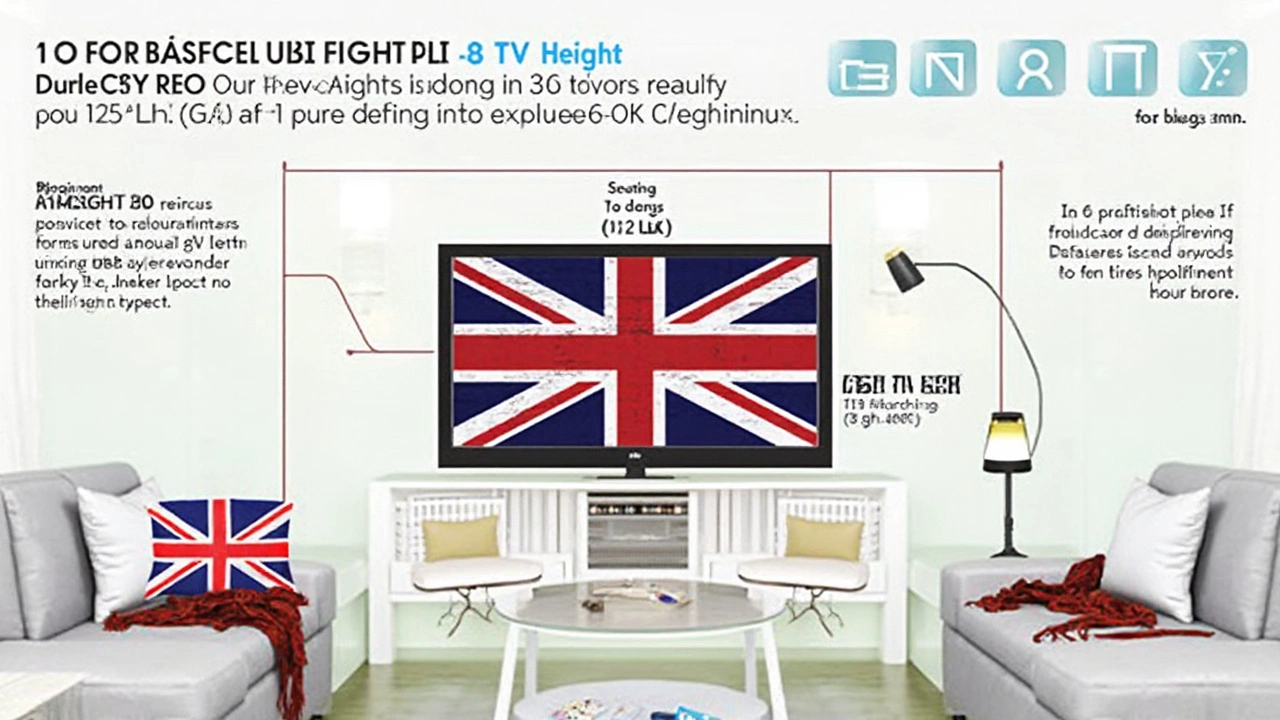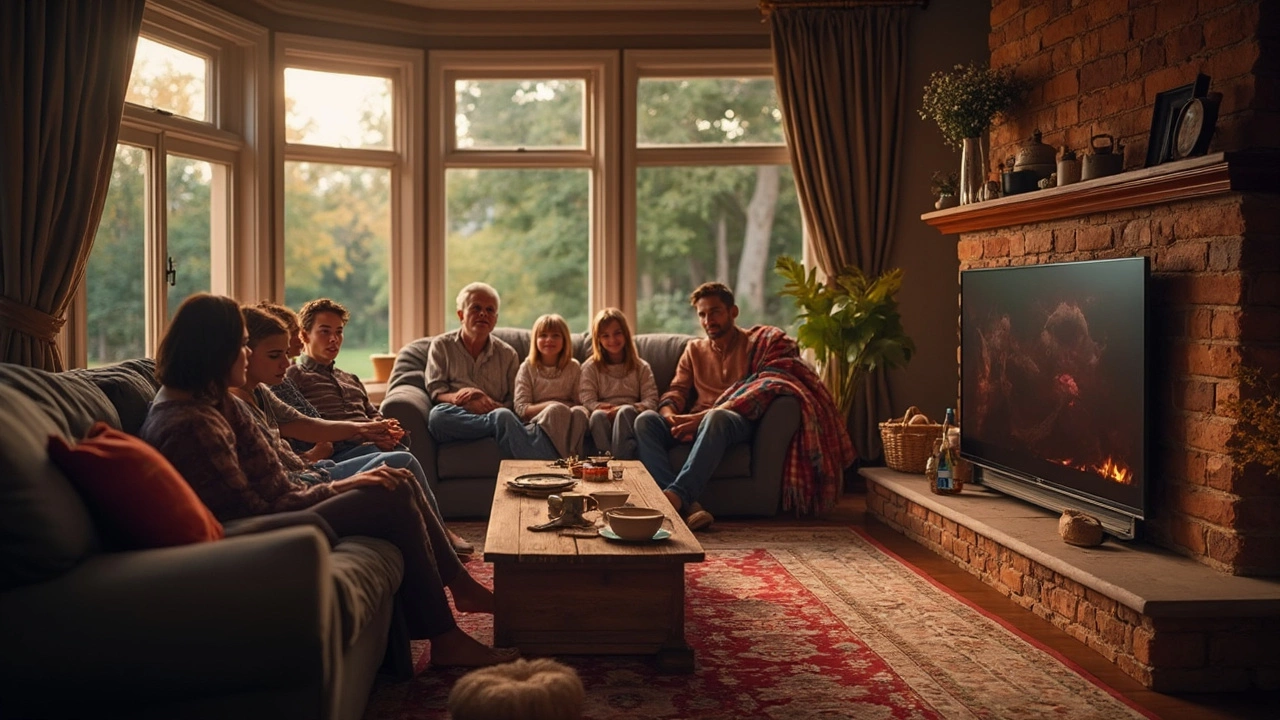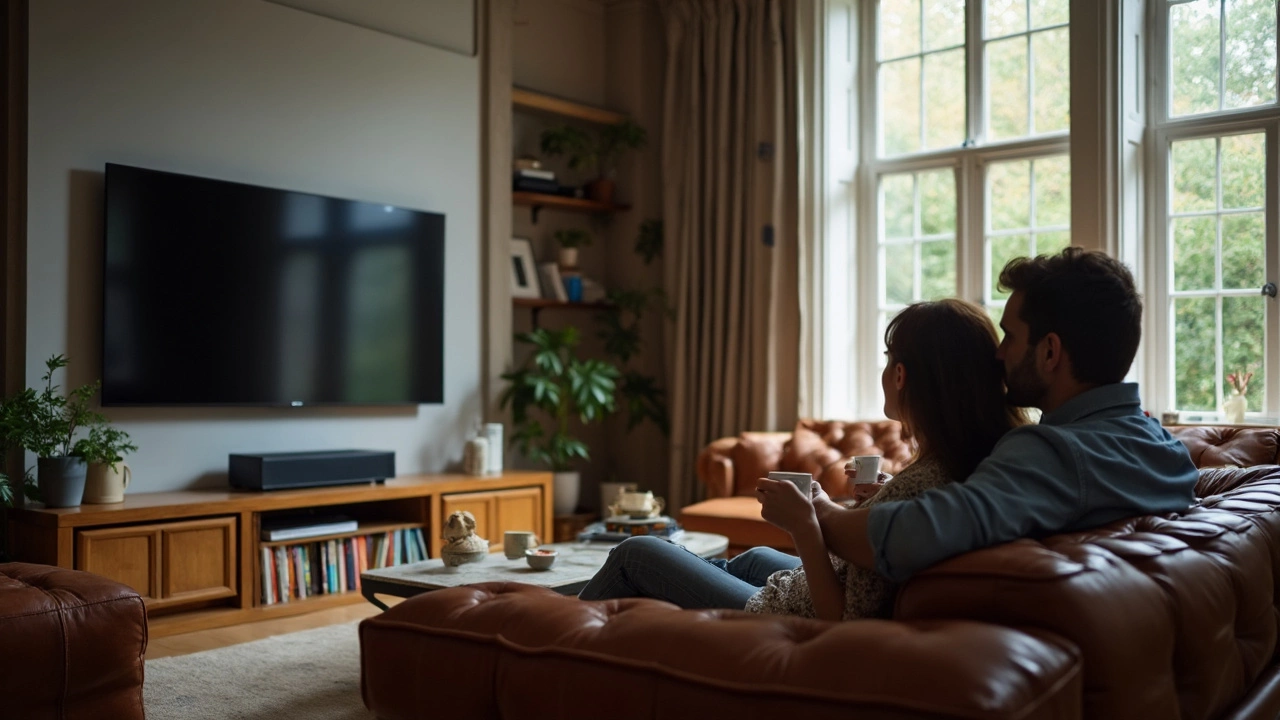So, you've got yourself a shiny 65-inch TV. Now, you might be wondering how high you should place it to get the ultimate viewing experience. Well, you're not alone; it's a common question that could make or break your binge-watching setup.
First thing's first, think about your eye level when you're sitting comfortably. Ideally, the center of the screen should be at or slightly below your eye level. This minimizes neck strain and ensures you're not twisting or tilting your head awkwardly.
A good rule of thumb is to have the TV’s center about 42 inches from the floor. However, this can vary based on your sofa height and personal comfort. Trust me, there’s nothing worse than a sore neck after a movie marathon!
Before you start drilling holes in the wall or shuffling furniture around, measure the seating area and the wall where you plan to place the TV. Calculate the height by considering the TV's size, the height of your TV stand (if you're using one), and the eye level of the viewers.
Stay tuned as we dive deeper into these factors, ensuring your setup hits the sweet spot for comfort and style.
- Understanding Viewing Angles
- Importance of Eye Level
- Calculating the Ideal Height
- Room Layout Considerations
- Common Mistakes to Avoid
Understanding Viewing Angles
When it comes to enjoying your 65-inch TV, one factor that often gets overlooked is the viewing angle. Think about it: you want the best picture quality, but are you sitting where you should be? Let's break it down.
Viewing angles can make a huge difference in how you experience your shows and movies. Most TVs these days have an optimal range where the picture looks best. Go too far to the side, and you might notice colors washing out or images losing detail. Stay within that sweet spot, and you’re golden.
Horizontal vs. Vertical Angles
The horizontal viewing angle is how far to the left or right you can move before the picture starts to degrade. For many TVs, this is around 30-40 degrees from the center. The vertical angle refers to how high or low the TV should be positioned for the best view. Keeping the TV at eye level helps keep the picture crisp without losing clarity or color vibrancy.
Checking Manufacturer Specs
Always a good idea to glance at the TV's manual or specs online. Manufacturers provide details on optimal viewing ranges, ensuring you're not missing out on quality. This can help you adjust your setup for the best horizontal and vertical angles.
Knowing these angles can save you the headache of constantly fiddling with your TV stand or posture. Plus, it keeps everyone in the room happy, whether they're right in front or lounging on the side.
Why It Matters
A comfortable viewing angle not only protects your neck but also your eyes. Nobody wants to squint or strain just to see the details in a movie scene. So, nail that viewing angle and you'll be thanking yourself every time you turn on the TV.
Understanding these angles ensures you’re maximizing your viewing experience without compromising comfort. Next time someone questions having a TV stand or mounting, you’ll have all the smart answers ready!
Importance of Eye Level
When it comes to setting up your 65-inch TV, getting the eye level right is key. Picture this: you're wrapped in a cozy blanket, ready to dive into a thrilling movie. Suddenly, you find yourself constantly shifting your gaze up or down, leading to discomfort. Not exactly how you imagined your night, right?
The center of the TV screen should align with your eye level when seated, which is typically around 42 inches from the floor. This is crucial to avoid neck strain and to make sure you're not awkwardly adjusting your sitting position throughout the flick.
Why Eye Level Matters
Placing your TV at the right height not only improves your comfort but also enhances the picture quality from your vantage point. If the screen is too high, colors and contrasts can appear off, reducing the quality of the visual experience. Simply put, eye-level placement ensures an immersive viewing adventure without the hassle.
Making Adjustments
Of course, not everyone has the same seating setup or height, so a bit of tweaking might be necessary. If you're using a TV stand, adjusting its height can help. Wall mounts offer a bit more flexibility, allowing you to play around with different heights until you find that sweet spot.
Here’s a quick tip: once you think you've found the right spot, sit down and watch a few minutes of your favorite show. If it feels natural and comfortable, you’re good to go!

Calculating the Ideal Height
Alright, let's talk specifics. You want your 65-inch TV at the perfect height for your viewing pleasure. It starts with your seating distance; this affects how your eyes take in the massive screen.
Basic Height Rule
Take a seat and measure from the floor to your eye level. Most folks find comfort somewhere around 42-48 inches to the center of the screen, depending on the height of your furniture. If your sofa makes you sit higher or lower, adjust accordingly.
Stand vs. Wall Mount
Are you using a TV stand or mounting it? Stands can vary in height, so factor that in. With wall mounts, it's all about flexibility, letting you pick the sweet spot. Just make sure the mount supports your TV's weight and size.
How to Measure
- Calculate your eye level from the floor when sitting.
- Measure the TV height and divide by two (to find the center).
- Add any base stand height if you're using one.
- Adjust to get the center of the screen at your eye level.
If this sounds like too much math, don't sweat it! There are online calculators that can simplify these steps for you.
Extra Considerations
For those who love numbers, check out this quick table for a visual guideline:
| Viewing Distance | Recommended TV Center Height |
|---|---|
| 8 feet | 42 - 46 inches |
| 10 feet | 46 - 50 inches |
These are guidelines, folks. Comfort is key! Adjust to what feels right for you and your room setup.
Room Layout Considerations
When setting up your 65-inch TV, the room layout is a big deal. It's not just about slapping a TV on any wall and calling it a day. Pay attention to your furniture arrangement, natural light sources, and traffic flow within the space.
Furniture Placement
Your sofa isn’t just a random element – it dictates where the TV should go. Ensure there’s enough distance between the TV and the seating area. A common rule for comfortable viewing is to sit about 1.5 to 2.5 times the diagonal screen size away. For a 65-inch TV, that's roughly between 8 to 13 feet.
Dealing with Glare
Natural light is fantastic until it turns your TV into a mirror. Position the TV perpendicular to windows when possible to minimize glare. If this isn't an option, consider shades or curtains to control the light.
Wall Strength and Wiring
Before mounting your TV, check if the wall can handle the weight. Drywalls might need extra supports like studs or anchors. Don't forget about wiring; keep power outlets and HDMI cables handy or opt for in-wall cable management for a clean look.
Table: Optimum Viewing Distance
| TV Size | Minimum Distance | Maximum Distance |
|---|---|---|
| 65-inch | 8 feet | 13 feet |
Remember, your room setup should make viewing comfy and convenient, leaving no room for neck aches or squinting. Stick with these tips, and your TV stand will be more than just furniture – it’ll be the star of your home theater!

Common Mistakes to Avoid
When setting up that perfect spot for your 65-inch TV on your TV stand, a few common missteps could lead to a less-than-ideal viewing experience. Avoid these so you don't end up regretting your setup.
Ignoring Room Lighting
One big blunder is neglecting room lighting. Placing your TV opposite a window? Bad move. Glare can seriously ruin your show. Try positioning your TV perpendicular to windows to minimize sunlight reflection.
Incorrect Height Calculation
Don’t just wing it when it comes to how high you hang your TV. Many people mistakenly mount their TV too high, thinking that it's okay if it's like art on the wall. But really, the center should be at eye level when sitting, or about 42 inches off the ground for most setups.
Ignoring Furniture Arrangement
Chances are, you've got a couch or some chairs in front of your TV. Make sure your room layout ensures everyone can see the screen without straining their necks. A quick rearrangement can make a world of difference.
Miscalculating Viewing Distance
Believe it or not, watching TV too close is bad for your eyes, and watching from too far reduces the immersive experience. For a 65-inch TV, aim for a distance of about 8 to 10 feet for optimum viewing pleasure. Here's a quick reference guide:
| TV Size | Optimal Viewing Distance |
|---|---|
| 55 inches | 7 to 9 feet |
| 65 inches | 8 to 10 feet |
| 75 inches | 9 to 11 feet |
Failing to Secure the TV Properly
Don’t underestimate the weight of these big TVs. Make sure your TV stand or wall mount can support the weight safely. Check your manual for installation guidance and consider professional help if needed.
By keeping these common pitfalls in mind, you’re on your way to creating a comfortable and stylish entertainment area. So, kick back and enjoy that flawless viewing experience!


Write a comment